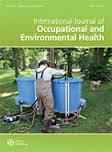
First, an occupational health journal appointed a new editor with industry ties without consulting the editorial board. Then, with no explanation, it withdrew a paper by the previous editor that was critical of corporate-sponsored research — again, without consulting the editorial board.
At that point, they’d had enough.
Yesterday, the editorial board of the International Journal of Occupational and Environmental Health sent a letter to the publisher, Taylor & Francis, expressing their “grave concerns” over the future of the journal, and its recent actions.
As part of the letter — signed by 30 past and present editorial members and the founding editor — they write:
IJOEH has stood in a class by itself in publishing critical analyses and challenges of improper corporate influence on the standards of practice and scientific literature in our field.
Originally, we raised serious concern that the Editorial Board was never consulted or informed by T&F about the change of editors, replacing Dr. David Egilman with corporate consultant Dr. Andrew Maier. We wrote to the publisher on February 11 requesting to know the process and justification for changing editors of a scientific journal without involving the Editorial Board.
As an illustration of their concerns, the board members note that Maier — chair of the fellows program at Toxicology Excellence for Risk Assessment (TERA), which the letter-writers dub a “corporate consulting firm” — recommends a significantly higher safe limit for diacetyl, a flavoring chemical used in microwave popcorn, than did former editor Egilman.
This month, the journal withdrew a 2016 paper by Egilman, “The production of corporate research to manufacture doubt about the health hazards of products: an overview of the Exponent Bakelite simulation study,” with a curt statement:
This content has been removed by the publishers.
The board members conclude their letter (which you can see here, with contact information redacted) with four demands:
1-The contract with Dr. Egilman as IJOEH editor will be renewed or the Editorial Board authorized to choose his successor as Editor-in-Chief.
2-All already-accepted papers will be published promptly.
3-Taylor & Francis will recognize that the Editorial Board shares full responsibility with the Journal Editor, and as such must be party to any decision to retract published papers, and that only after accepted procedures for scientific journals are followed.
4-T&F will agree that any decisions to add or drop members of the Editorial Board will be made by the Editor-in-Chief and the Editorial Board, not by the publishing company.
IJOEH board member Arthur Frank of Drexel University told us:
I’ve been publishing since the 1960s. I’ve been at this a long time. And I’ve never seen this kind of arrogance from a publisher who didn’t deal with the board of a journal in terms of transitions like this.
Frank added that he has a paper in the review pipeline at the journal that he resubmitted with minor revisions, and has waited months for a decision — a process that normally takes weeks. His main concern, he said, is that the journal will move in a direction in which it becomes more friendly to corporate interests.
We have enough of those already, especially one with a long history of being honest and forthright about what’s going on with the world.
Egilman, at Brown University, forwarded us the email he received on March 17, 2017, informing him that his 2016 paper was being withdrawn. The email said:
Due to an omission of oversight, the manuscript was not subject to our in-house review prior to its publication. Subsequently we have reviewed the content, and decided to withdraw it from publication.
Egilman told us:
My term as editor expired and T&F did not renew my contract.
He noted that he thought it was strange the journal didn’t consult the board before picking a new editor:
I never saw an ad for the job. I don’t know how a publisher picks an editor for a journal when they don’t consult the editor or editorial board.
Regarding the future of the journal, Egilman — who once paid a drug company $100,000 to settle a suit over confidential information about the safety of a pharmaceutical drug — told us:
…I have always been worried about the publication of articles that are not valid, no matter what interest group or person may think they benefit from that. In the long run the truth about exposure-disease relationships usually become apparent. Delaying the recognition of those relationships increases the number of people who are injured or die.
We asked a representative of Taylor & Francis — which took over the journal in 2015 — why they retracted Egilman’s 2016 paper, which critiqued a corporate-sponsored study about the risks of a product containing asbestos. She told us:
…it was published inadvertently, before the review process had been completed. On completing that review, it was decided the article was unsuitable for publication in the journal.
The representative said she would not be able to comment on our other queries regarding the letter from board members by deadline. We’ve also contacted new editor Maier, who also holds an appointment at the University of Cincinnati College of Medicine. He told us:
I can assure the readers of the journal that the plans for the journal remain to publish high quality science. With regards to other concerns I have developed a response for the editorial board regarding my own background and the publisher is addressing additional aspects related to matters that occurred prior to my appointment. Further direct dialog with the board is a key priority for myself and Taylor & Francis as the publisher.
Former board member Barry Castleman, an environmental consultant, told us why he chose to sign the letter:
I decided that we need to — as the people who are most involved and concerned with the journal — we need to do what we can to save it.
He added that he hopes the publisher takes heed of how many people signed the letter.
I think that should carry great weight, so we’ll just have to see what happens next.
[Source:-retractionwatch]










